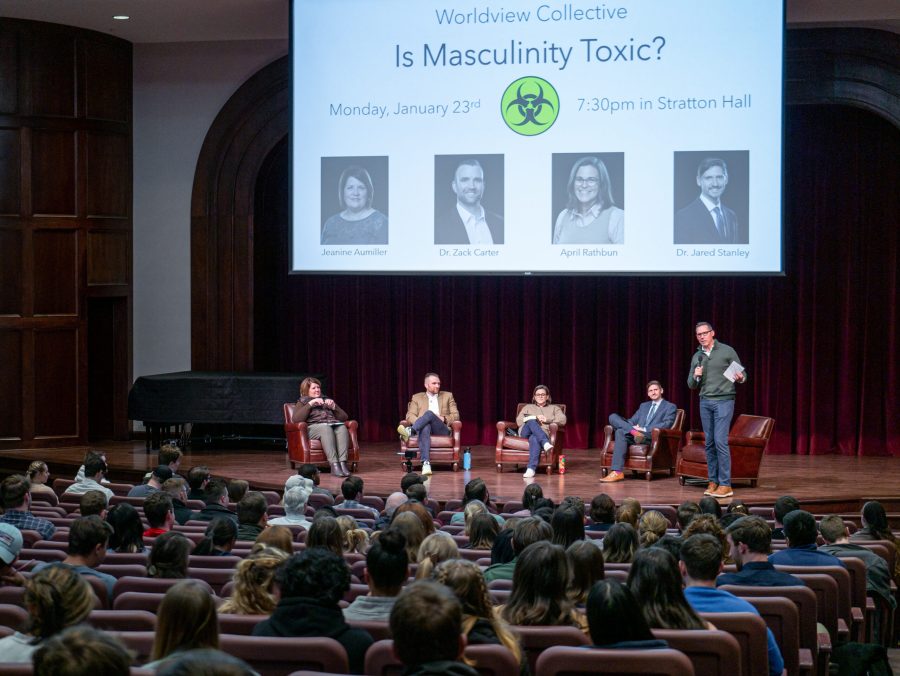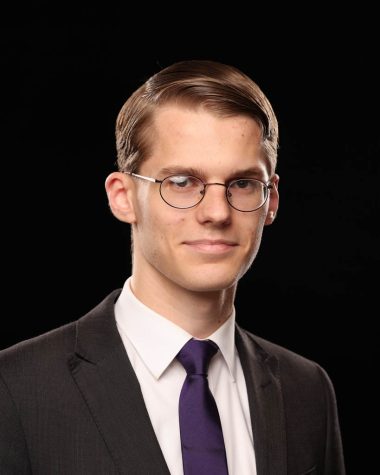During the first few weeks of classes, students noticed posters around campus bearing the evocative headline “Is Masculinity Toxic?” On Monday, Jan. 23, at 7:30 p.m., five Bob Jones University faculty and staff members answered students’ questions on the topic in Stratton Hall. Renton Rathbun moderated the event and was joined by four panelists: Jeanine Aumiller, Zack Carter, April Rathbun and Jared Stanley.
Renton Rathbun, director of BJU’s Center for Biblical Worldview, was the first to speak. Rathbun brought his experience in fields such as apologetics, theology and philosophy to the forum. He is also a husband and a father.
Rathbun said he largely abdicated his responsibilities as a husband during the first several years of his marriage to April. In light of this experience, Rathbun emphasized that husbands ought to embrace a self-sacrificial leadership in marriage that gladly shoulders responsibility instead of expecting their wives to do everything.
Jeanine Aumiller is the director of BJU Alumni Relations. She brought her extensive experience in public communication. The panel wanted to benefit from her perspective on masculinity as a single woman who has spent her career in fields often dominated by men.
Aumiller’s paternal grandfather, in her words, “probably would fit just about every definition out there of toxic masculinity.” She expressed her gratitude that her father worked to shun his father’s negative example. Whenever her father did act in ways that are rightly understood as toxic masculinity, Aumiller noted his humility in owning up to his faults. “He would be very quick to go quiet if I were to bring up to him that, ‘you just dismissed me.’ And I think a lot of the women in the room, you may have experienced this already, of being dismissed by a male.”
Zack Carter is a member of the communication studies faculty and is passionate about promoting healthy interpersonal relationships, which was a key topic throughout the conversation.
To illustrate his vision of positive, self-sacrificial masculinity, Carter brought up the 2012 shooting at a movie theater in Aurora, Colorado. Twelve victims were murdered, including five men who died shielding their girlfriends or friends. “The guys, all … of them died laying on top of their girlfriends, protecting them. And that is what we’re called to, men. And that is not what we have in our culture. And that should be nothing that we should be ashamed for, to say that we are to guard and protect and defend.”
April Rathbun also brought a variety of experience to the discussion, including her work with the Center for Biblical Worldview and being the only wife and mother on the panel. Rathbun recounted how her father treated her during her childhood. “There was a lot of lashing out if something wasn’t done exactly the way that he wanted it to be done,” she said. “But then he also was wonderful, and he provided for us, and he would take great care of teaching us how to do various things …. So if I can say it this way, kind of a Jekyll and Hyde aspect of my father.”
Jared Stanley is an Art + Design professor at BJU. He contributed his expertise in televisual studies to the forum’s discussion of how American cinema has shaped cultural perceptions of masculinity. Stanley argued that rather than overemphasizing traits like assertiveness or roles with authority that men often serve in, masculinity should be defined by verses like Titus 2:7, where believers are commanded to model good works in everything and live lives of integrity. Stanley mentioned taking responsibility, dependence on God, extraordinary love, forgiveness, servant leadership and bravery without bravado as examples of virtues for young men who love the Lord to pursue.
While the 90-minute forum did not answer every question fully, the panelists hoped the discussion was beneficial for audience members seeking to embrace God-given gender roles in a humble, teachable and deeply biblical way, rather than assuming that traditional gender expectations are flawless or that current cultural trends are infallible.
Renton Rathbun’s prayer at the beginning of the forum highlighted this goal: “Lord, we pray that our hearts will be open not to politics and not to traditional things, but Lord, what Your Word says. Lord, let us be Bible believers.”



























































